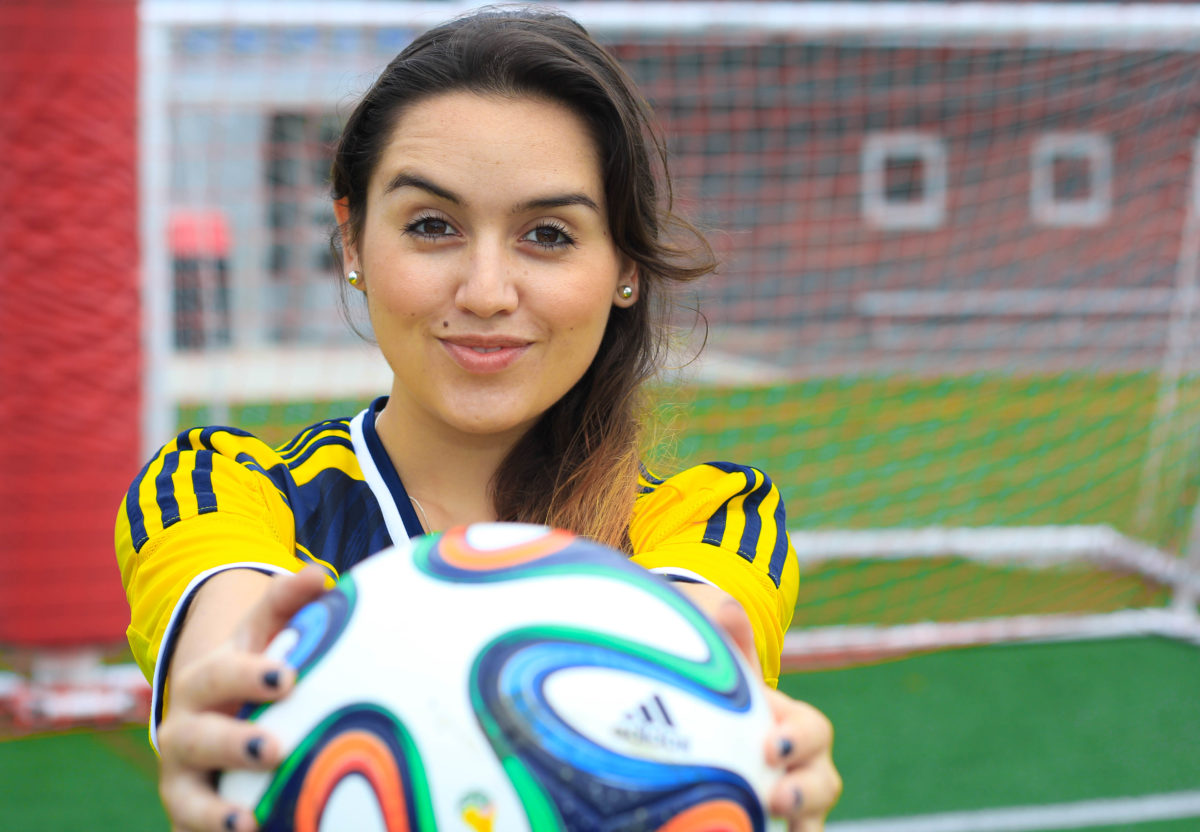 The first day I cried was that Saturday. After 16 years, my team was going to the quarterfinals in the biggest soccer event on earth, the World Cup.
The first day I cried was that Saturday. After 16 years, my team was going to the quarterfinals in the biggest soccer event on earth, the World Cup.
The sports announcer was almost crying of happiness, saying “GOOOOOOOOOOOOAL, scored from a country called Colombia, a crack shot named James Rodriguez, he gave us a painting like a Picasso, a work of art, chest, turned and shot … That has to be yelled by an entire country! Colombia to the quarterfinals!”
I wore my yellow jersey during that whole magical month and I painted my face with the colors of my flag for every match. All we talked about was soccer— in the street, in the elevator, at the supermarket and in my house. During that month everybody back home was like family, because we were all striving for the same dream: the golden cup that would give us a title we’d brag about for years.
It didn’t matter if you were in your hometown or you were watching the matches in neighboring countries. We all felt like brothers and sisters because we were sharing the same excitement of watching great soccer.
Several Colombian idols had been recognized worldwide in the past; Carlos “The Kid” Valderrama, the goalkeeper René Higuita- known for his daring “scorpion kick,” Faryd Mondragon, and some others. But this golden generation of Colombian football that occurred from the mid 80’s until the beginning of the 2000’s was the start of an uncontrollable passion that united an entire country.
Colombia is well known for the warmth of its people, for that folkloric feeling that encourages dancing and celebrating life. We’re one of the happiest countries in the world, and that month, the “coffee selection” was giving an entire country its greatest triumph. Every day was a party; a tricolor party that made us forget real life and gave us an illusion to believe that our country didn’t have problems anymore.
And then, all of our pride reached heaven. Colombia came back to a World Cup 16 years later with probably the best team in their history, even without the presence of Falcao, and with by far the best player in the tournament— James Rodriguez. He finished the tournament with the title of top scorer, coming up with six goals and two assists.
Rodriguez was our young star. After that month, he became known worldwide after being the sensation of the tournament. After the World Cup was over, he was linked with one of the most popular teams in the world, Real Madrid.
But how can I really explain what the World Cup means for my culture?
Brazil 2014 was a festival full of sounds and colors, full of joys and sorrows, full of spirit, enthusiasm and hope. It’s true that soccer has it all. It was over three months ago when fans from all around the world flew to get to the hot land that gave birth to samba and the carnival.
But imagine for a second the feeling of shouting “GOAAAAAAL” while your heart is invaded with the excitement of the moment. Imagine for a second the feeling of watching your team playing all out, while Christ himself is watching and blessing the match with his stunning figure from the top of the Corcovado Mountain. Imagine watching all of your people wearing the colors of your flag while singing your national anthem along with thousands of compatriots around the world and then watching your players cry as they sing on the field.
The World Cup left us with many unforgettable moments, moments that could transform the most incredulous into a hopelessly devoted patriot, because it’s true, during the World Cup the world is paralyzed. Families and countries come together, and suddenly the most important thing is not to study, or work, or even the wars. At that time a beautiful sport like this has the power to invade, submerge, and finally drown its fans into the emotion of seeing their team competing on that field.
How do you forget the bond that generates from such a big event?
This beautiful sport, that manages to have fans all around the world, is not just about who dominates the ball, who scores more goals or who’s the player with the most exuberant salary. Soccer is much more than that. It’s passion, it’s desire, and it’s pure feeling, blood, sweat and tears. It’s to give it all for your country, for your jersey. It’s to give it all along with the thousands of fans chanting when your team enters the stadium and then deposit all your prayers, trust and faith on them.
In my culture, soccer is much more than people think; football changes, transforms, heals and builds, and all this is done in silence while it absorbs our full devotion for 90 unforgettable minutes.
